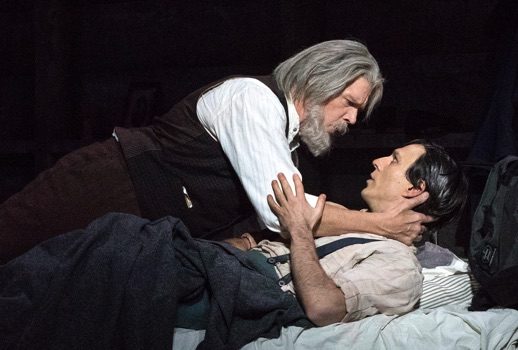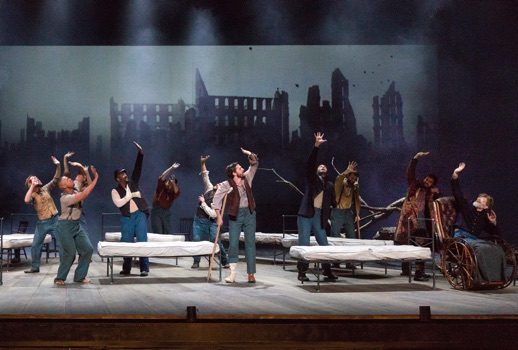
Bi-curious, not judgmental.
Walt Whitman, that great American bard of free verse who sent legions of us struggling to define “yawp” in our AP English classes, was also a man of queer taste. By the outbreak of Civil War, he’d become something of a dandy about town—a well-known New York belletrist who fancied Romantic poetry, loved to skinny-dip with The Youth, and enjoyed mooning over bel canto rep in the bosomy company of contraltos.
“Opera may have provided a way for Whitman to process the horrors of the Civil War,” explains Joshua Barone in a recent article for The New York Times. According to Barone, certain “operatic flourishes” even grace Whitman’s volume Memoranda During the War, which the poet wrote to eulogize those who’d survived the battlefield.
Tuesday night in Fort Greene, such operatic flourishes were on full display, with the Brooklyn premiere of a loud, academic chamber opera loosely inspired by Memoranda and whatever else may have been going on behind the scenes.
Young composer-librettist Matthew Aucoin’s Crossing—first introduced in Massachusetts two years ago and reprised in Brooklyn for a four-performance run at BAM—depicts Whitman’s experience serving wounded soldiers in a DC infirmary and chronicles the period’s tragic effects.
It also, however, tracks the unfolding of a personal relationship between Whitman and one of his convalescents, who eventually pairs off with the poet for an ecstatic if uncomfortable-looking Liebesnacht on an army cot.
The end result is an artistically uneven work that provides some satisfying metaphors and moments of able choral singing but few memorable points of identification for its audience. And despite the composer’s best efforts to humanize the conflicted and complex characters, they tend to register as not wondrous or even intriguing, but simply weird.
When he first enters the arena, Whitman (baritone Rod Gilfry) has been searching for his brother at a Washington clinic for Union soldiers, but stays on as a volunteer upon seeing the state of his wounded countrymen.
A sensitive and almost sappily compassionate humanist in this telling, the poet works hard to understand the chorus of soldiers and their motives. We get to meet a few of them, including Freddie (Davóne Tines), a haunted runaway slave from South Carolina who later joined the Union fighters.
Soon, a crazy-eyed injured soldier named John Wormley (Australian tenor Alexander Lewis) disrupts the scene, capturing the interest of our own goodwill ambassador Walt Whitman.
After consummating their ambiguous nurse/patient affinities one night in a love scene that might have been sweet but actually ended up infesting my moral compass with creepy crawlies, the two begin to uncover a series of, ahem, hard truths about each other: Wormley, we learn, is in fact a rebel soldier on a mission to expose and destroy the clinic. Whitman is, well, Walt Whitman.
“Hold fast, America. This hour too shall pass,” he chants in his aria “Crossing Brooklyn Ferry,” which ends Act I. By the time a messenger (marvelous Jennifer Zetlan) arrives to inform the Union of their victory, it is clear that no one, not even the living, has fully survived the war.
Earnestly directed (as at its Boston premiere) by Diane Paulus, conducted by Aucoin, and led by all four of its headliners from the earlier show, this production looks a lot like it did in 2015. As then, audiences are treated to solemn excerpts from Whitman’s own poetic work set to Aucoin’s quivering, flute-heavy modal music, and urged implicitly to consider all kinds of crossings—between characters, political viewpoints, motives, and even elements of the self.

“… and the Ulysses S. Grant dancers!”
In order to remind us such metaphors exist, Paulus and her team have hauled in and de-trunked the big visual cues. Sets by designer Tom Pye are spare but hardly subtle: a cabin-like facade opening up to reveal the spacious interior of hospital infirmary, a Lincoln portrait here, a Union flag there, hospital beds strewn throughout like fallen leaves.
Lyrical passages such as Freddie’s dirge near the end of Act I (with its visions of “machines that flew through the sky”) get blown up and illuminated with big projections by designer Finn Ross. Choreographer Jill Johnson sets other musical episodes to movement, encouraging four dancers in soldier’s uniform to weave and bob among the singers.
Unfortunately, what also emerged from all this on Tuesday was the withering sense that everyone was working overtime to squeeze symbolic “big meaning” out of a routine, thematically repetitive score.
I must be the only show queen on earth who doesn’t get the hype over Harvardian scholar-oracle Diane Paulus: to me, her musical productions—Waitress, that circusy Pippin, the swingin’ Porgy and Bess revival that so irked Sondheim—are all consistently littered with those same showy, ongepotchket choices that flood the stage with erudite references but let nary a narrative breathe on its own.
When I’m settling in for an intimate aria about the past, I don’t also need it mimed, projected, and dance-acted for me, do I? At least Paulus left the Big Top at home this time.
The principals, meanwhile, all did their best under the clutter, with solid singing from each. Despite some occasional pushing, Lewis turned in a suitably feral performance as Wormley; Tines’ grainy bass-baritone brought Freddie to broken-down life.
And Gilfry remained a marvel as Whitman, successfully negotiating the ridiculous beard he’d been dealt with some truly hairy vocal writing. In all this the best work came from the chorus, an assortment of male singers who provided the opera with several of its most lyrical passages.
Would this all have worked better as an oratorio, I wondered. Aucoin, who in a recent interview with The Last Magazine pronounced Whitman “the most operatic spirit in American history,” finished his score at age 25.
Yet while the music, here gamely played by Boston-based orchestra collective A Far Cry, is certainly respectful of tradition—I heard hints of Britten, for sure, but also of Adams and even Berg—it’s rarely truly moving as a cohesive piece of human drama, and suffers from an ardent bookishness I imagine the composer might one day outgrow.
What makes historical opera come to singing, breathing life isn’t history, but rather the recognizably human, emotional proportions of it characters. Here, historical figures were oddly staid, speaking in philosophy and metered verse, or else glowering about the stage, ready for the next peroration. We don’t really feel a whole lot about the hapless love story of Walt and John, because they make no sense as an item to us.
Even their passions (“Can I let myself sink/Into the night/And into you” etc.) are set in a way that feels more anonymously historical than chemical, personal—or even very hot?
Which is not to say I couldn’t relate to the characters at all. “I stand in the dark with drooping eyes by the worst-suffering and the most restless…” laments Whitman at the top of Act II. By the end of the act, at least to some extent, I must say I could feel his pain.
Photos: Richard Termine



